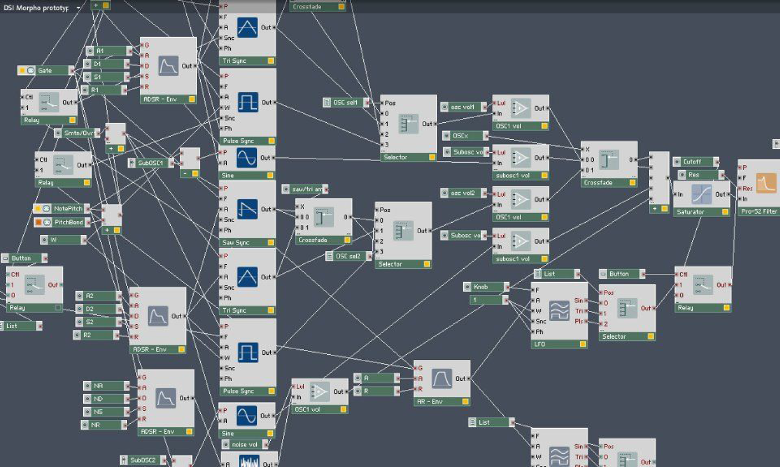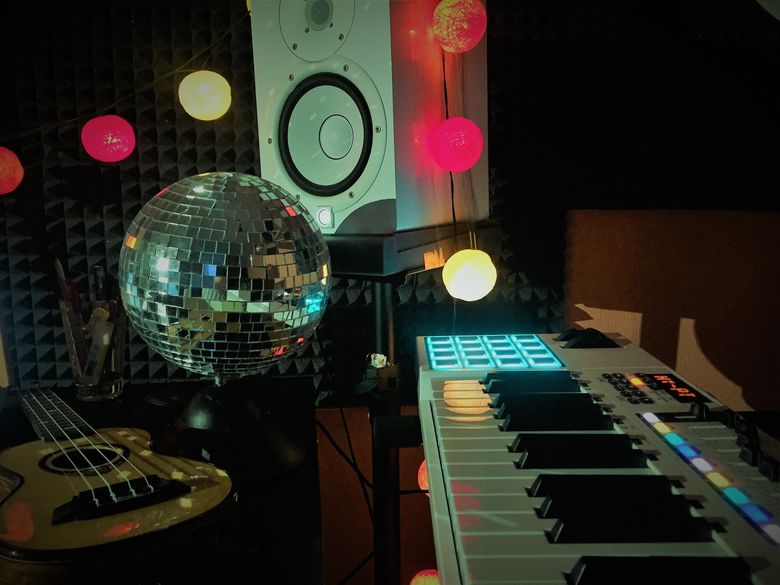Atmosphere or pain: how to choose music for a computer game

Hi, Habr! We recently opened a game development department at GeekBrains so that students immerse themselves in this fascinating world. Music is its important part. Many people think that music is secondary in comparison with graphics or gameplay. At the same time, developers of large-scale projects often collaborate with famous composers to create the atmosphere of the game.
So, the legendary Hans Zimmer wrote the music for the second part of Modern Warfare. Silent Hill was hardly so mysterious without the compositions of Akira Yamaoka. The founder of Nine Inch Nails, Trent Reznor, is the author of Quake music, and Tommy Tallarico is not only known to be related to Stephen Tyler (leader of Aerosmith), but also to soundtracks for more than 250 computer games. In this article, we together with experts from the gaming industry will try to figure out how important the musical component in the game is.
 Oleg Makarenko, head of the art department of the IT Territory studio (Mail.Ru Group), has been working in the game direction for more than five years:
Oleg Makarenko, head of the art department of the IT Territory studio (Mail.Ru Group), has been working in the game direction for more than five years:
- The main goal of the music in the game is to make the gamer want to continue playing. Therefore, the soundtrack is an integral part of the game. Not the main, but mandatory. Music must be of high quality and appropriate. Her choice depends on the genre and the setting of the game. The picture, characters or surroundings - all this affects the musical accompaniment, which must correspond to the mood and the overall concept of the game.
Players often turn off the sound when passing games. The reasons may be physical (in order not to disturb others, there is no possibility to listen with headphones, etc.) and psychological (music distracts, annoys, does not allow to concentrate). There are cases when a person is not so important whether there is music. For example, in simple games with a short gaming session, it is often turned off. This also applies to mobile games.
 Ruslan Nesteruk, Mail.Ru Group sound designer:
Ruslan Nesteruk, Mail.Ru Group sound designer:
- It seems to me that there are three reasons why people turn off music in games. First: there is an opinion that vision is paramount in the perception of any information, first we pay attention to the picture and only then - to the sound. Therefore, for someone in itself, the presence of music may not be so important. The second: practice shows that if the sound is made well, then it is not paid attention. If it is bad, they will definitely notice it, so it has happened. And finally, the third simple reason: physical. If it is a console or PC and you play at home alone, the sound can not be turned off. But if there is someone else nearby - sometimes you have to do it. From the screen, you can simply turn away, the sound is distributed everywhere - this is its huge plus and at the same time a minus.
Many sound designers pay more attention to gaming sounds than music. This is because sounds are perceived as signals that cause the brain to respond to them in one way or another. Having heard the steps in the game, we first think that someone is approaching our character and now we need some kind of action, be it a handshake or merry bazooka lights. All this should sound appropriate. The sound of the flamethrower should not be associated with the rustling of the autumn foliage, and the soundtrack for the shootout should be reminiscent of the very song from Titanic. Now let's see how the sound designers themselves achieve the desired result .
Personal experience
 Alexander Ahura, the author of voice acting over 200 games:
Alexander Ahura, the author of voice acting over 200 games:
- I do not think through the concept in advance, do not draw any schemes, and so on. I just write music as my thoughts flow into my head. Someone does and vice versa, focusing on the prepared plan of action. It is impossible to say which of these approaches is better or worse, just personally the intuitive-abstract is closer to me, because you never know in advance what awaits you at the exit.
Sometimes you have to write a live sound. However, it already depends on the budget. On my own, I can write down the instruments at hand: a guitar or a ukulele. A more complex process, such as recording an orchestra, requires the preparation of a special room, the search for additional musicians, and so on — this is expensive in all respects. Personally, I mostly do everything on my own and rarely resort to third-party resources. But this does not mean that everyone does this. Much depends on the particular cases, budget and technology used.
One of the most difficult projects with which I happened to work was Knighttron - a flash game in the RPG genre. The difficulty is that you had to squeeze the volume of sound (the total amount of memory that the track occupies) - such restrictions are often found in portal games. Therefore, approximately 25-30 short tracks were made, literally 30 seconds each. We thought out such a logic of their work that the music was constantly changing and did not have time to bother the player. In general, the result was quite acceptable.
Among the most successful examples of musical design of games, I would highlight the following:
- Mass Effect series.
- "Gothic". Although it is rather difficult to listen to a single soundtrack, it looks great in combination with the game.
- The Witcher series, where I liked the soundtrack to the first part. There was a good symbiosis of orchestration and folk with a slant to the orchestra. The second part is designed in about the same way. In the third part, the main emphasis was on folk with a very distinctive sound. The moment is controversial, but personally the version used in the first part is closer to me. It cannot be said that the third part turned out to be bad, it just differed greatly from the previous ones.
Music by Alexander Ahura:
Gameplay track from Snail Bob
Introduction theme from the game Headless Zombie 2
Gameplay track from the Brave Shorties game
Gameplay track from the game Back to Santaland, the New Year version of the series Back to Candyland - Match3
Track from the puzzle Fancy Diver

Photo: Ruslan Nesteruk
Ruslan Nesteruk, Mail.Ru Group sound designer:
- It is worth saying that the work of the people who create the sound part of the game is associative and quite subjective in its essence. How successful the “developer-sound” hit will depend on is the ability to subtly feel the mood. Of course, the more detailed the TK, the better. This is a work based on sensations. Much depends on the experience of the sound designer / composer and the sound palette he owns.
Choosing the right
So that your music is not turned off, carefully consider its choice and consider how harmoniously it will fit into the game. To do this, consider two points:
1. The relationship with the gameplay. Sound logic

Screen: Ruslan Nesteruk
The main difference of gaming music from soundtracks to any other video series (for example, to movies) is interactivity. Therefore, the first thing you need to think about is how the audio series will interact with the gameplay. At a minimum, the music should not obviously discord with what is happening on the screen, as the maximum should help better perception of the picture, plot, actions and events in the game.
Alexander Ahura, sound designer, voice author of over 200 games, including Zombotron and Back to Zombieland:
- There are many varieties of games, and music is done depending on their type. For example, when dubbing a big game, the cinematic approach can work, because there are a lot of cut-scenes - moments when the player just watches what is happening, as if watching a movie. Music is interactive in both large and small-scale games. The situation in the game can change in a completely unpredictable way, like music. But there are also simple games, where there is no pronounced change of events and just some ambient in the background.
The professional community supports the idea where the sound designer in games is partly a programmer, because he works with sound engines and thinks through the logic of sound. In this regard, competent selection of sounds is considered more important than the musical component itself.
The music itself can be awesome, but if there is not the same amazing sound effects logic, there will be little sense from it. Music is one of the elements of the sound part of the game. Without music, the game will work, without properly made sounds - hardly.
In small-scale projects, the same person can engage in music and logic; in large-scale projects there is a whole team where division into a separate integrator, sound designer, composer, and so on occurs. It all depends on the scale and budget. In indie projects there are often budgetary restrictions, therefore, one person (as a rule, a sound designer) is engaged in sound logic and directly in music.
Ideally, a sound designer can work on integration, but there are few such specialists, usually they are very expensive. It is important to take into account the scope of work: if they are large, it is likely that a person simply will not pull a one-time work on these three components alone - then a division of labor will be required.
Our developers advise to evaluate the product in the aggregate: and music, and sounds, and sound effects. Characteristics of sound, which is worth paying attention to:
- aesthetic component (musicality, compliance with the basic canons of musical theory);
- technical characteristics (absence of unnecessary noise and frequencies hitting the ears);
- the versatility of the musical soundtrack (so that everything sounds equally good on different speakers).
2. Compliance with the genre, moods and general concept of the game

Photo: Margarita Maslova
There is no direct dependence of the genre of music on the genre of the game. At the same time, some style correspondences can be distinguished. For example, medieval motifs perfectly highlight the epic of Viking battles, and the dark ambient minimalism will show the mystery of an abandoned factory in the moonlight. Such correspondences are quite natural and familiar to our ears, but this does not mean that we should forget about the experiments. Of course, it is important not to go to extremes: the psychedelic goa-trance is unlikely to help concentrate on the quest, and the bulky lounge will hardly give the fighting spirit to the shooter (unless, of course, this is not justified by the game's plan).
Ruslan Nesteruk, Mail.Ru Group sound designer:
- There are probably no such trends in music in games. Perhaps this is logical: if they were, all computer games would sound the same. If we are dealing with fantasy - the music makes you dream, think and so on. In hard games like Doom, it may sound like rock, stim or cyberpunk, for example. The mood of the game is created with a specific purpose - based on this, the musical style is selected.
The most important thing is to build on the player. Music can be selected, including depending on the missions. Example: general style - fantasy, mission - acquaintance with the world. You go out into the world, look around from the first person and listen to non-stressed background music. If this is a fight and you come across a werewolf somewhere in the forest, the music is already different, its goal is to tune for victory, not for defeat. Music can also depend on the level of the gamer. For example, the beginner player will sound light, while the gamer of the 100th level wears a lot of heavy armor, and the task of the music is to emphasize it.
Oleg Makarenko, head of the art department of the IT Territory studio:
- The developer expects to receive from the composer music that will fit the stage and action. For example, if somewhere in the game there is a purchase and sale of something, playing background, unobtrusive music. If there is a city in the game where a gamer spends a lot of time, this background music should not bother. When fighting a player must feel with whom it was he who entered the battle: with an ordinary opponent or with a boss. The task of music is to place accents and beat the moments so that the player clearly understands what is happening to him at a particular moment.
Alexander Ahura, the author of voice acting over 200 games:
- It is difficult to isolate any direct dependence of the musical genre on the game. There are some established canons to which we are accustomed. For example, music for fantasy is often folk motifs, a variety of woodwind and orchestral instruments. In the genre of sci-fi dominated by electronics. But this is not the rule, but rather the rule. Moreover, a good composer sometimes has to break the generally accepted rules in order to bring something fresh - but here you need to act carefully, because not everyone will understand the strong departure from the canons. Any musical experiments should be justified by the elements of the game.
It is also important musical designation of states. For example, in the horror genre, music can express a lot. Despite the fact that there may be few actions in the game itself, in gamer's horror it is necessary to frighten from time to time - and music in this regard serves as an excellent means of expression.
Which is better: find ready, order or make yourself
Having decided on what should be the audio range, you can begin to translate the plan. There are three ways:
1. Do it yourself
The most interesting, but controversial way. Interesting, because you are your own master, you don’t need to explain anything to anyone, let alone pay for the cat in the bag. All this is great if you have at least minimal skills in the field of music and sound engineering, you have hearing and taste, and your hands are growing out of your shoulders. And if you also know solfeggio, know how to play musical instruments and are not afraid of words such as mixing (mixing, connecting all separately recorded tracks, the most important stage of sound direction) and mastering (final sound processing, the final stage of working on a phonogram before releasing it into light), then generally beauty.
Why is the option controversial? If the above is not about you, you are unlikely to achieve a quality result. But the attempt is not torture, and why not really try to make music or synthesize sounds yourself?
For this you will need:
- Sequencer (DAW-program) for working with sound . There are many of them: there are more fundamental ones that are often used in professional studios (Cubase, Nuendo, Pro Tools, Logic Pro X), but they can be difficult for a beginner; There are easier to learn - FL Studio, Ableton Live or Presonus Studio One. To argue about which sequencer is better is to argue about programming languages. Each has its advantages, disadvantages and goals of use, so the choice will depend on which program is more convenient for you to work.
- Studio monitors are a professional speaker system for monitoring sound quality. Unlike conventional speakers, monitors should have the most linear frequency response (amplitude-frequency response) so that the sound is reproduced with the least distortion. Ideally, it is better to have three pairs of monitors with a different frequency range - this will allow you to control high, medium and low frequencies separately. It doesn’t hurt to have any bad speaker to understand how your work will sound on low-quality speakers (for the so-called shit-control).
- Sound libraries, virtual synthesizers, VST plug-ins . In essence, these are the fillers of your DAW. Raw materials from which you sculpt sound. At the same time, nothing prevents you from recording voice or live instruments (guitars, flutes, and so on) - for this you need to acquire microphones and wires with the necessary commutation.
- Competently soundproof room . This will help you acoustic foam (in the people - "triangles"). The room can be isolated in other ways (for example, to build stuffed glassy panels or to glue the room with egg packages in the best traditions of rock and roll). To achieve good sound insulation at home is quite difficult, not to mention the fact that windows and mirrors perfectly reflect the sound.
- Understanding the fact that to achieve the ideal environment for working with sound at home is almost impossible . Even acoustic foam and professional equipment do not always save. Especially in panel houses. In addition, not all sound engineers working at home comply with the above points. And not all developers have high demands on the quality of the recording and information, someone does not attach any importance to these parameters. It all depends on your goals and the desired result: a monumental work of art with awesome graphics and deep stereo sound or a simple flash game with a couple of plain background tracks.
So, you tried to create a soundtrack and write music yourself. Happened? Congratulations, then this path is yours. Did not work out? Do not worry, there are other options.
2. Use ready-made content.
The easiest, but treacherous way. Simple, because you do not need to reinvent the wheel and attract people from the side: press the button - you will get the result. Moreover, there are resources where sounds and music can be downloaded for free. They are popular and convenient. Especially if your time and budget are limited.
But saving time and money can miss a very important aspect - the uniqueness of the content. Ready tracks are available to everyone, so hundreds of other developers can use your chosen music. Then the audio part of your game will be one of those that bring monotony to the market. In addition, you need to carefully examine the license terms and copyright. Otherwise, wait for the consequences, because the Criminal Code of the Russian Federation has not been canceled.
If these nuances do not confuse you, here is the five most popular sites for you, where you can find free music or sounds for a computer game:
- Freesound.org
- OpenGameArt.org
- Freesoundeffects.com
- Pacdv.com
- Soundgator.com
3. Turn to professionals

Photo: Ruslan Nesteruk
The most costly, but effective way. The main advantage is exclusivity, since in this case sound design will be created specifically for your project. When choosing a specialist, one should focus on his portfolio in order to at least approximately represent the final result. You can apply to both professional recording studios or sound design, and freelancers.
The main disadvantage of the studios is the high cost. But there are significant advantages:
- Professional equipment.
- Competent sound insulation.
- A wide range of sound libraries.
- A team of professionals working in various genres and controlling sound quality.
- It's easier to find (as a rule, the studio has a site with the necessary information, the freelancer does not always have it, which complicates the search).
The search path of a freelancer is rather thorny: there are no sites specializing in music for computer games (or they are not popular), so developers have to search for a performer all over the Internet or through acquaintances. The principle of word of mouth can work better than independent googling: most likely, you will be recommended to proven masters who have been tested in practice, including those whose experience has already gained trust and authority in professional circles. With the expanses of the Web is more difficult, because the range of options offered by the search query is too wide and there is a lot to be filtered.
Where to find a freelancer:
- Internet communities of musicians: Musicforums.ru, Aranzhirovki.com and their analogues.
- Popular portals with music or video content: SoundCloud or YouTube - many spread their portfolio there.
- Job search sites and recruiting companies (Freelance.ru, HeadHunter). They do not specialize in music, but they should not be neglected. Periodically there you can catch a summary of the arranger, composer, sound engineer or sound producer.
- Through personal contacts of your favorite musician. Some developers simply monitor the work of composers or soundtracks to videos, and then find the author of the track of interest, contact him and agree on cooperation.
Oleg Makarenko, head of the art department of the IT Territory studio:
- I will say from my personal experience: as a rule, composers are ordered at an outsource - usually people outside the project who have no idea what he lives. The biggest stumbling block is communication. Here it is important to bring your desires to the composer or sound engineer as accessible as possible. A way out of the situation - references, examples of already existing works with the similarity of the result that you want to achieve. The simplest thing is to show examples from cool games and make it as accurate as possible to know what you want.
We summarize
- Music and sounds are important: they create an atmosphere, help immerse themselves in gaming reality and connect all elements of the game.
- Sound design should be logical and interactive. Music should not contradict what is happening on the screen.
- You can write music yourself if you understand the basics of musical theory and sound engineering, have the ear, taste, professional equipment and high-quality sound insulation at home.
- To make the audio content high-quality and unique, it’s better to turn to the sound producer or composer.
- It all depends on how lucidly you explain the task to the sound designer. The principle of communication is the same for everyone - to be able to listen to each other and not be afraid to discuss controversial issues, especially in the early stages of product creation.
- It is equally important to clearly define the dates. It is necessary to start working together as early as possible, break it into tasks and monitor the implementation of each of them, so that there is always an opportunity to calmly redo something.
')
Source: https://habr.com/ru/post/348708/
All Articles